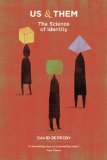Summary | Excerpt | Reviews | Beyond the Book | Readalikes | Genres & Themes | Author Bio

Critics' Opinion:
Readers' Opinion:
First Published:
Oct 2005, 384 pages
Paperback:
Oct 2008, 396 pages
 Book Reviewed by:
Book Reviewed by:
BookBrowse Review Team
Buy This Book
In 1969 Honduras and El Salvador went to war over a soccer match.
Today gangs of "soccer hooligans" shadow games in Europe,
where they maim and occasionally kill each other in the name of their
teams. A study of such violence in Holland found that these
soccer tribes were racially mixed and drew poor, working class, and
higher-income men. In other words, members' devotion to their teams
wasn't a stand-in for some supposedly more serious loyalty to class or
race. The human kind for which they risked their lives was the soccer
gang.
As sports wars go, these recent instances are unremarkable compared
to combat between "fans of the green team in the chariot race"
versus "fans of the blue." The fighting over those two kinds
of person spanned centuries in the Byzantine Empire, as the opposed
groupings grew into political, cultural, and organized-crime
institutions. One of these outbreaks of mass violence, at Constantinople
in 532 C.E., killed thirty thousand people.
A human kind need not acquire tribal myths, as "Aryan" did,
nor gather people under team colors, as sports fans do. Banal, practical
human kinds have also been made fatal. One way to be targeted during the
Cambodian genocide of 1975-79, for example, was to be the kind of person
who wears eyeglasses.
This was not because the country's traditional human kinds were
forgotten. The Yale historian Ben Kiernan has documented how the Khmer
Rouge's genocidal policies hit - and were intended to hit - Vietnamese,
Chinese, and Cham people harder than Cambodian Khmers. Nonetheless, more
than 1 million Khmer perished out of approximately 1.7 million people
killed in this atrocity; being Khmer was not in itself enough to protect
anyone. To be spared, one had to be the right sort of Khmer. To wear
glasses was to show the sign of being the wrong sort - a person who had
received an education under the old regime. A happenstance human kind
became a means to sort the living from the doomed.
Many don't want to believe people kill, or die, for a mere mental
pigeonhole. So they turn to the other levels of explanation: wars over
soccer games and chariots must "really" have been about other,
respectably economic and political matters.
Certainly soccer wars and chariot races did not blot out Salvadoran
thoughts or Byzantine schemes. But people belong to many human kinds at
once; he who is proudly Dutch in many circumstances may nonetheless die
fighting other Dutchmen, in the name of Rotterdam's team. In that
moment, in that place, it is not nation or race that determines who is
murdered, but soccer fandom. In that moment, it's the warrior's belief
that counts. An economist may find causes for mob violence that the mob
never heard of; the fact remains that the people killing and dying in
ancient Antioch were talking chariots, not economics.
So kind-mindedness is not "really" something else in
disguise. It is itself - the mind's guide for understanding anyone we do
not know personally, for seeing our place in the human world, and for
judging our actions. This human-kind psychology is a source, not just a
consequence, of institutions: national governments, religious
authorities, promoters of ethnic, racial, class, or gender pride. We care
about today's political tribes only because these entities have learned
how to speak to the human-kind faculty in its language.
Speaking the right human-kind language, you can make any happenstance
collection of people feel tribal, even one like "women on the 8:15
ferry." In fact, a documentary filmmaker made a movie about
just that group - women who spent their morning commute together chatting,
putting on makeup, and relaxing in the ladies' room of the 8.15 Staten
Island Ferry. When the film came out, the women told reporters their
membership in that particular human kind meant a lot to them. And their
earliest response to the filmmaker had been to wonder who this outsider
was and why she was hanging out in their territory.
Copyright © 2005 by David Berreby. No part of this book maybe reproduced without written permission from the publisher.





The House on Biscayne Bay
by Chanel Cleeton
As death stalks a gothic mansion in Miami, the lives of two women intertwine as the past and present collide.

The Flower Sisters
by Michelle Collins Anderson
From the new Fannie Flagg of the Ozarks, a richly-woven story of family, forgiveness, and reinvention.

The Funeral Cryer by Wenyan Lu
Debut novelist Wenyan Lu brings us this witty yet profound story about one woman's midlife reawakening in contemporary rural China.
Your guide toexceptional books
BookBrowse seeks out and recommends the best in contemporary fiction and nonfiction—books that not only engage and entertain but also deepen our understanding of ourselves and the world around us.